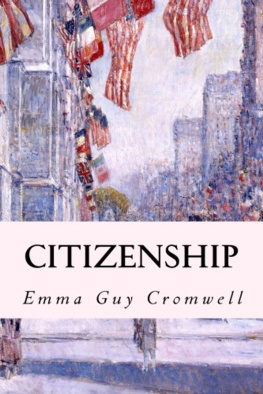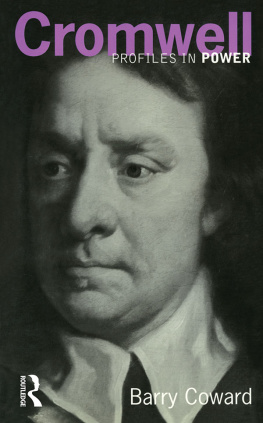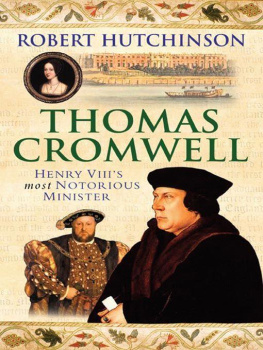CHAPTER I.
Citizenship.
G
G ood citizenship means doing well one's part as a member of the community in which he lives, and carries with it certain privileges and duties.
A citizen is one who has the rights and privileges of the inhabitants of the community, state and nation, and as a duty should equip himself so as to render the best citizenship possible.
There are two classes of citizens; native born, and naturalized. Persons born in the United States and children born of American parents while abroad are native born. Naturalized citizens are aliens who through the process of naturalization have attained citizenship. Naturalization itself does not give the right to vote, as that is determined by the state laws. Most states give all citizens the right to vote who have lived in the state for one year, and about eleven states permit aliens to vote provided they declare their intention of becoming citizens.
Congress has the power to decide the conditions upon which aliens may become citizens.
Citizenship carries with it the enjoyment of civil rights, as the protection of the home and property, freedom of speech, religion, press, protection of the laws, etc. Wherever you go your citizenship goes with you, protecting and defending you. If you are in a foreign country you must abide by the laws of that country, but should you be treated unjustly the United States would protect you.
Our country is a land of freedom and opportunity, and it is our duty to help uplift the government, and as citizens we must study conditions and know how to govern and be governed. We must be familiar with our national and state Constitutions, for they are the fundamental principles by which we are governed. We must know how to make laws and how to have them executed. We must keep posted on the issues of the day, and know something of the standing and character of our public men and women.
The citizen who does not possess some knowledge of his government and its workings will become a prey to the demagogue, or of individuals who are anxious to advance their own interest at the expense of the people.
It is the duty of every man and woman under the protection of our flag to give his or her best to the country and be willing to take upon themselves the burden as well as the privilege of government, and fully appreciate the inheritance our fathers left. "They built the foundation in the days of Washington and Jefferson, and as a duty we must safeguard the building."
Citizenship not only embraces civil rights, but political rights which is the right of suffrage or voting.
While civil rights are enjoyed by all men, women and children, political rights are enjoyed only by citizens twenty-one years old and over who possess the necessary qualifications to vote. Civil rights and political rights are not the same, for all citizens are not voters, neither are all voters citizens in the United States, as some states permit aliens to vote before they get their citizenship paper, making them real citizens.
It is our duty to study our government and be posted on the issues of the day. There are about 27,011,330 women voters in the United States. We have the vote and let us not only count it a privilege but a duty to do our part as citizens in establishing good government.
There are two principal parties in the United States, the Democratic party and the Republican party.
The way to get good government is through the parties; that is one reason women must choose their party and enter into the organization of the party of their choice.
Parties are just what their constituents make them.
Government.
The word government means management or guidance and control.
When we speak of the government of the nation, state, city, town or county we refer to the management of public affairs.
Government protects life and property, keeps an army and navy for our defense, peace and order, regulates commerce and industry, supports our public schools, keeps the roads and streets in good condition, cares for public health, and many other things we enjoy.
Our courts are maintained by the government where justice may be found.
The laws of our nation are the rules made by the government to guide our actions. They tell us what we are to do, and what we are not to do. We must obey the laws of our country or else be punished. We must study the government of our nation, state, city, town and county, and be ready to do our part in establishing good government, by making proper laws and seeing they are enforced. As far back as 500 B. C. we find in Athens lawmakers, judges and executive officers.
The word government is derived from the Latin word gubernare, which means to guide or "pilot a ship." Good government depends upon the voters, and may our men and women of the United States pilot our ship into a safe harbor.
The United States is both a Democracy and a Republic.
A Democracy is a government by the people in which the will of the people prevails throughout the country. "This is the fundamental principle of American government."
A Republic is a democracy where the people elect representatives to carry on the government.
Constitution.
When the colonies became independent states each state drew up a charter which recognized its people as authority in government. Instead of calling this new instrument a charter they changed the name and called it a "Constitution."
This Constitution is the foundation upon which our government is built. After the thirteen original colonies had established their independence they formed a central government known and expressed in the Constitution of the United States which is our fundamental law.
In the preamble of the Constitution of the United States we find the general purpose for which government is instituted:











